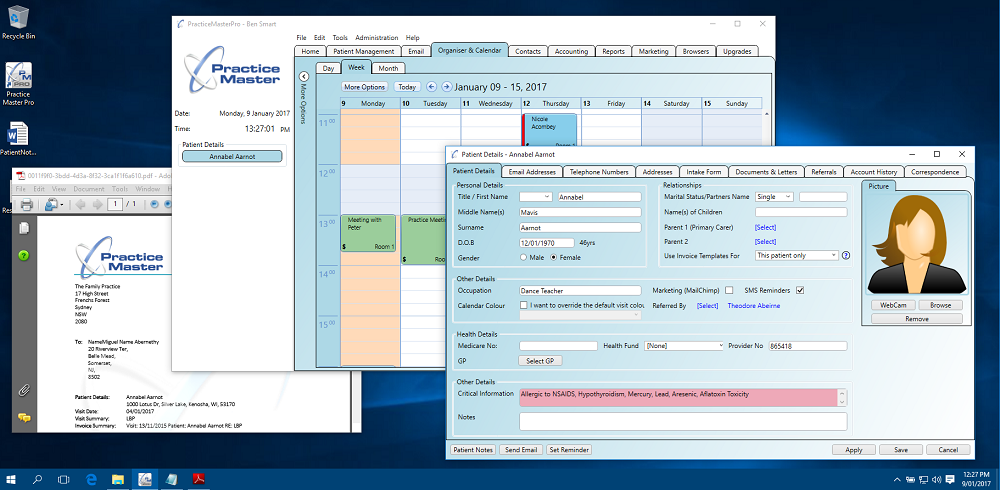In the current fast-paced healthcare environment, incorporating technology in medical practice management has become more essential than ever. As the rising demand for efficiency and enhanced patient care, medical practice management software emerges as a vital tool for healthcare providers. This solution simplifies administrative duties, improves patient interaction, and optimizes various operations, enabling practitioners to concentrate on delivering high-quality care.
As medical practices grow and transform, so do their challenges. Managing scheduling, patient records, billing, and compliance can become overwhelming without the right tools. By utilizing medical practice management software, practices can leverage the power of automation and data analytics. This implementation not only diminishes the administrative burden but also fosters a better organized and efficient healthcare setting, ultimately leading to a superior experience for both providers and patients alike.
Advantages of Medical Practice Management Software
Using medical practice management software can substantially enhance the effectiveness of a medical practice. By optimizing administrative tasks such as scheduling appointments, handling patient records, and managing billing processes, this software minimizes the workload on staff, allowing them to focus more on patient care. The streamlining of routine tasks lessens the risk of human error and guarantees that data is precisely captured and maintained.

Another key benefit is the enhanced patient experience supported by medical practice management software. With features such as digital appointment booking and access to patient portals, patients can interact with their healthcare providers more comfortably. This ease of access not only boosts patient satisfaction but also encourages better communication between patients and healthcare professionals, leading to better health outcomes.
Furthermore, medical practice management software provides crucial analytics and reporting tools that help practices choose wisely. By accessing up-to-date data on operations, financial performance, and patient demographics, practices can identify areas for improvement and optimize their resources effectively. This data-driven approach enables practices to enhance their services and ultimately achieve improved operational efficiency and profitability.
Key Features to Look For
When selecting medical practice management software, a key feature to consider is appointment scheduling. A good scheduling system should allow you to manage patient appointments with simplicity, reducing wait times and lessening scheduling conflicts. Look for software that offers the ability for patients to book online, automated notifications to decrease no-show rates, and a user-friendly interface for both staff and patients. These capabilities can drastically improve patient satisfaction and enhance your daily operations.
A crucial feature is billing and coding integration. The best software should streamline the billing process by automating claims submissions and tracking reimbursements. Look for medicloudmed.ch that include robust coding tools, easy access to insurance verification, and thorough reporting capabilities. This not only enhances revenue cycle management but also minimizes billing errors, making sure your practice gets paid correctly and on time.
Compliance and data security are crucial considerations as well. With the sensitivity of patient information, you need software that focuses on security through encryption and frequent updates to protect against breaches. Additionally, ensure the software complies with regulations, such as HIPAA, to maintain patient confidentiality. A trustworthy medical practice management software will provide audit logs, user permissions, and data backup options, ensuring your comfort that your practice is safeguarded against potential legal and financial repercussions.
Implementation Tactics for Success
To efficiently integrate healthcare management software into your organization, begin with a comprehensive requirements analysis. Connect with your team in discussions to determine present issues and process shortcomings that the software can target. Focusing on features that match with your practice's unique needs will guarantee that the proposed system enhances efficiency without burdening staff. Including key stakeholders in the selection process fosters ownership and encourages support from everyone involved.
Once you have chosen the software, develop a thorough implementation plan. This should include timelines, educational workshops, and a transparent communication strategy. It is vital to allocate time for staff development, as this will enable them to use the new system effectively and with assurance. Offering ongoing assistance and resources will facilitate smoother adaptations and help alleviate any apprehensions regarding the new technology.
Lastly, track and assess the software's impact periodically. Set benchmarks and success metrics to measure how well the software is fulfilling your practice's objectives. Collecting feedback from staff and implementing needed changes will ensure ongoing enhancement. By nurturing an flexible environment and being sensitive to challenges, your medical practice can enhance the value of the practice management software and maintain a efficient workflow.
